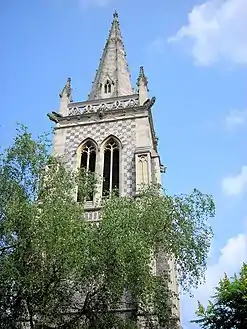Richard Phipson
Richard Makilwaine Phipson (1827–1884)[1] was an English architect. As diocesan architect for the Anglican Diocese of Norwich, he was responsible for renovating almost 100 churches in East Anglia.[2]
_St_Andrew's_Church_-_geograph.org.uk_-_68591.jpg.webp)
Biography
Phipson was born in Ipswich. He was diocesan surveyor (architect) for the Anglican Diocese of Norwich from 1871 to 1884, and a county surveyor in the 1860s, though he was active from the 1850s. He restored a large number of churches in East Anglia in the middle and late 19th century:[1] he was "fond of big, unexpected figure and foliage carvings".[3] He was responsible, for instance, for the St John the Baptist church in Harleston, the interior of the St Peter Mancroft church in Norwich, and the near-complete rebuilding of St Mary le Tower church in Ipswich.[4][5] The diocese then included East Suffolk, where he worked on many churches, including All Saints, Holbrook,[6] Thelnetham Church[7] and St Mary's Burgh-next-Aylsham.
Notable projects
St Mary-le-Tower is the civic church of Ipswich, and "the nearest thing the town will ever have to a cathedral. This is Suffolk's Victorian church par excellence. It is full of the spirit of its age, from the Suffolk flushwork to the international gothic of the spire itself. One could no more imagine Ipswich without 'the Tower' than without the Orwell Bridge," according to Simon Knott.[8] There was a medieval church on the site, which was almost entirely demolished in the 1860s, so that the present exterior is largely Phipson's, although the nave arcades and some monuments and fittings inside remain from the original.
Phipson replaced the tower and spire at Woolpit after they were destroyed by lightning in the 1850s. Despite his use of a style typical of Northamptonshire, rather than Suffolk, his spire is largely accepted as a success by most authorities.[9] unlike his one at Great Finborough, sometimes dubbed "Thunderbird One" after the Supermarionation space rescue vehicle.[10] He also oversaw the restoration and alteration of the Moot Hall, Aldeburgh in 1854–1855.[11]
In 1865–66 Phipson oversaw restoration of St Peter's Church at Ickburgh, a project paid for by Francis Baring, 3rd Baron Ashburton. Phipson's work is praised as "surprisingly fine".[3] In 1868, he added a chapel to the Union Workhouse at Beetley in Norfolk, now the Norfolk Rural Life Museum.[12] He restored All Saints in Alburgh in 1876, adding "pinnacles with little flying buttresses" and reworking the chancel.[13] In 1883 he restored the outside of St Peter's in Easton, Norfolk,[14] and in 1886 the tower of St Andrew's in Kirby Bedon, the church in which he is buried.[2]
Besides churches, Phipson also designed commercial buildings, including a bank on Hall Quay in Great Yarmouth.[15] In the 1880s Phipson appears as one of the "chief landowners" of the parish of Winfarthing in Norfolk.[16]
Gallery
 St Mary-le-Tower, Ipswich, a new church by Phipson on the site of a medieval one.
St Mary-le-Tower, Ipswich, a new church by Phipson on the site of a medieval one. Chapel of the former Union Workhouse, Norfolk
Chapel of the former Union Workhouse, Norfolk St Mary, Burgh-next-Aylsham
St Mary, Burgh-next-Aylsham Saint Mary's Church, Woolpit — the tower and spire are Phipson's
Saint Mary's Church, Woolpit — the tower and spire are Phipson's
References
- Wilson p. 158.
- Wilson 506.
- Wilson 446–47.
- "St John the Baptist, Harleston". The Norfolk Churches Site. Retrieved 29 April 2011.
- Suffolk Churches
- "All Saints, Holbrook". Suffolk Churches. Retrieved 29 April 2011.
- "St Mary, Rickinghall Inferior". Suffolk Churches. Retrieved 29 April 2011.
- St Mary-le-Tower, UK: Suffolk Churches
- Not Jenkins, p. 667, but Norwich, 609, and Suffolk churches.
- biography Suffolk Churches
- Historic England. "Details from listed building database (1269716)". National Heritage List for England. Retrieved 30 July 2011.
- Wilson 370–71.
- Wilson 177.
- Wilson 322.
- Wilson 155.
- Kelly's Directory for Cambridgeshire, Norfolk & Suffolk, 1883, p. 559.
Bibliography
- Wilson, Bill (2002). revised Pevsner Architectural Guides, Norfolk, Part 2. Yale UP. ISBN 978-0-300-09657-6.
- Jenkins, Simon, England's Thousand Best Churches, 1999, Allen Lane, ISBN 0-7139-9281-6
- Simon Knott, Suffolk Churches biography; see also "Woolpit", "Great Finborough", "St Mary le Tower, Ipswich" etc.
- John Julius Norwich, The Architecture of Southern England, Macmillan, London, 1985, ISBN 0-333-22037-4